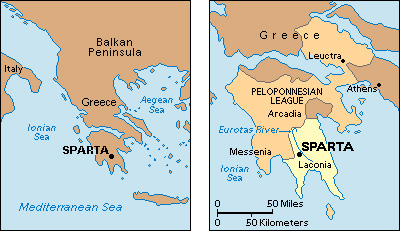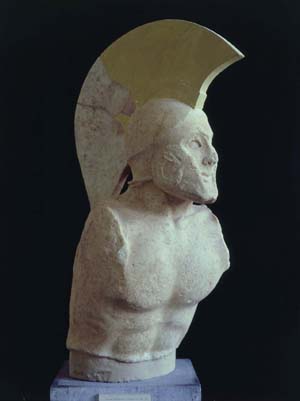Sparta, also called Lacedaemon << `las` ih DEE muhn or las ih DY mohn >> , the capital of Laconia, was at one time the most powerful city-state of ancient Greece. It was famous for its military power and its loyal soldiers. The greatest honor that could come to a Spartan was to die in defense of the country. Endurance, a scorn of luxuries, and unyielding firmness are still spoken of as Spartan virtues.

The land.
Sparta was situated in a lovely, sheltered valley on the bank of the Eurotas River. It was protected on three sides by mountains. The climate was mild, and the soil was fertile and well watered. Sparta had few mineral resources. Spartans obtained marble and a little iron from nearby Mount Taygetus.
The people
belonged to three classes. The Spartans themselves were descended from the Dorians, a people who invaded the Greek peninsula in the 1100’s B.C. They were the ruling class of Sparta and were the only ones who had full rights of citizenship. They enslaved the earlier Greek peoples of Laconia, the Achaeans and Ionians. These enslaved Greeks, who were called helots << HEHL uhts >> , outnumbered the Spartans. Some of the non-Spartan Greeks escaped enslavement. They were not citizens, but they lived in Sparta as free people. This group was known as the perioeci (also spelled perioikoi << `pehr` ee OY koy >> ).
The numbers of the three classes during Sparta’s long history are not well known. Some historians estimate that at the height of Spartan power there were about 10,000 citizens, an unknown number of perioeci, and about 200,000 helots.
Way of life.
Spartan citizens could engage only in agriculture. A few aristocrats owned their own land. However, a majority of the citizens held state-owned plots. Citizens who could not make enough from their estate to support their family and pay the taxes lost their land to someone who could make it pay. They also lost their citizenship. Because citizens could not carry on manufacturing or trade, the perioeci took over these pursuits. Some of them grew wealthy.
The helots farmed the soil, and they had to give a fixed amount of produce, probably half of what they grew, to their master. The helots bitterly resented their lot, and revolts were not unusual. Once a year, the Spartans officially declared war on the helots, so that they could kill any who seemed rebellious without breaking the law against murder.
Every Spartan male belonged to the state from the time of his birth. A committee of elders inspected each male infant. Those who were not physically sound were taken to the mountains and left to die of exposure to the elements. A boy was left to the care of his mother until he was 7 years of age, when he was enrolled in a company of 15 members, all of whom were kept under strict discipline. From the age of 7, every boy had to take his meals with his company in a public dining hall. The bravest boy in a company was made captain. The others obeyed his commands and bore such punishments as he decided they should have.
When the boys were 12, their undergarments were taken away and only one outer garment a year was allowed them. Their beds consisted of the tops of reeds, which they gathered with their own hands and without knives. Spartans did not consider the arts of reading and writing necessary. Boys learned the Iliad and songs of war and religion, but leaping, running, wrestling, and wielding a weapon with grace and accuracy were held much more important. Between the ages of 20 and 30, Spartan men served as cadets who policed the country, kept the helots in order, and exacted disciplined obedience from the enslaved people.
At 30, a Spartan male attained full maturity and enjoyed the rights and duties of citizenship. He might marry, attend meetings of the assembly, and hold public office. He continued to train and eat with the members of his company. At 60, his military career ended, and he worked either in public affairs or in training the young. As a result of this system, the Spartan men became tough, proud, disciplined, and noted for obstinate conservatism and for brevity and directness of speech.
Spartan women, on the other hand, lived the freest life of any women in Greece. As girls, they engaged in athletics, and as women, they ran their own households. They engaged in business, and many became wealthy and influential. Aristotle tells us that women owned two-fifths of the land in Sparta.
History.
The Dorians who settled in Sparta extended their control over all Laconia at an early date. In the 700’s B.C., they conquered Messenia, the rich farming region to the west of Mount Taygetus. Sparta failed to conquer the cities of Arcadia but forced them to enter the Peloponnesian League. The members of the league were obliged to follow Sparta in war. By 500 B.C., this league included most cities in southern and central Greece.

Sparta conquered Athens, the leader of the powerful Athenian Empire, in the hard-fought Peloponnesian War. In 404 B.C., the Athenians were forced to accept a humiliating peace treaty. But the leadership won by Sparta was short-lived. The Spartans ruled over the other Greek states so cruelly that they revolted. At the battle of Leuctra, in 371 B.C., the people of Thebes decisively defeated the Spartans. Thebes then liberated the Messenians and crippled Spartan power forever. In 146 B.C., Sparta came under the control of Rome.
There is a modern town of Sparta near the site of the ancient city. It was laid out about 1835 and made the capital of the modern political division of Laconia. Excavations have been made on the old site, and much valuable material has been discovered from the early city’s history.
